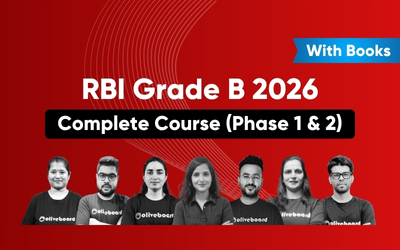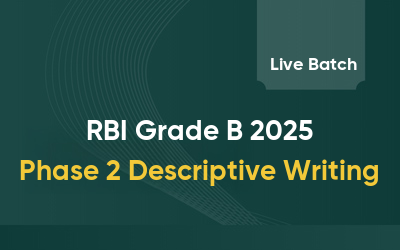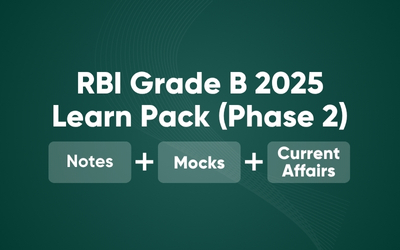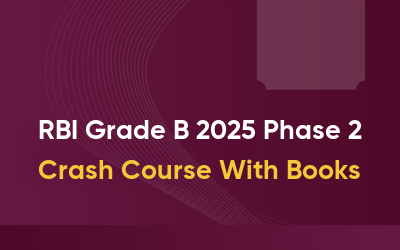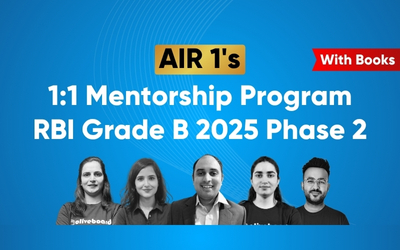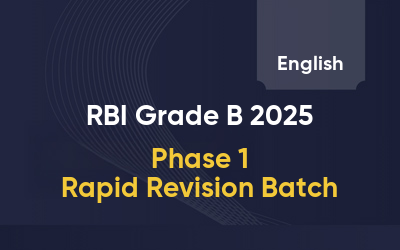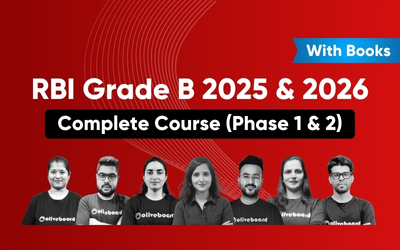Becoming an RBI Officer is a dream for many aspirants who want a prestigious government job with great responsibilities, good salary, and career growth. The Reserve Bank of India conducts the RBI Grade B Exam every year to recruit officers in various departments. If you're aiming for this post, here's everything you need to know.
Who is an RBI Grade B officer and what are their responsibilities?
RBI Grade B Officers are entry-level officers in the Reserve Bank of India. They are responsible for handling currency issuance, managing monetary policies, and ensuring financial stability. It's a central government job that offers a mix of administrative work, decision-making, and policymaking.
Solve RBI Grade B Previous Year Papers
What is the path to becoming an RBI Grade B officer?
If you are planning a career in banking, becoming an RBI Grade B Officer is a great choice. The RBI Grade B Exam is conducted by the Reserve Bank of India at the national level and offers a good salary along with a highly respected position. The selection process has three stages: Phase I, Phase II, and an Interview. Candidates who clear Phase I move on to Phase II, and those who meet the Phase II cut-off are called for the final interview. Once selected, candidates begin a 2-year probation period, which can be extended to 4 years if required.
Attempt RBI Grade B Mock Test 2026
How to become an RBI Grade B officer?
Becoming an RBI Grade B Officer requires a combination of eligibility, preparation, and clearing a multi-stage selection process. First, ensure you meet the eligibility criteria: be between 21–30 years old (with relaxations for reserved categories) and have the required educational qualifications usually a graduation degree with minimum marks or post-graduation if needed.
Next, you need to clear the RBI Grade B exam, which has three stages: Phase 1 (Prelims), Phase 2 (Mains), and the Interview. Phase 1 tests your aptitude, reasoning, and awareness, while Phase 2 focuses on Economics & Social Issues, Finance & Management, and English writing skills. Finally, shortlisted candidates are interviewed to assess communication and knowledge. A focused preparation strategy, covering both Phase 1 and Phase 2 topics along with regular mock tests and current affairs, is key to success.
| Step | Details | Tips |
|---|
| Check eligibility | Age 21–30, graduation with required marks, relaxations for reserved categories | Verify your eligibility before applying |
| Apply online | Fill RBI Grade B application on the official RBI portal | Keep documents ready, double-check entries |
| Prepare for Phase 1 | General Awareness, Reasoning, Quantitative Aptitude, English | Use standard books, online mock tests, and daily current affairs |
| Prepare for Phase 2 | Economic & Social Issues, Finance & Management, English Writing Skills | Make short notes, practice essays, solve previous years' papers |
| Attempt mock tests | Phase 1 & Phase 2 mock tests to identify weak areas | Analyze mistakes and improve consistently |
| Interview preparation | Focus on communication skills, confidence, and subject knowledge | Practice mock interviews with peers or mentors |
| Final selection | Based on Phase 2 + Interview marks | Maintain consistency and clarity in preparation |
What are the responsibilities of an RBI Grade B Officer?
As an RBI Grade B Officer, you'll be managing key operations at the Reserve Bank of India. Your responsibilities may include:
- Regulating and Supervising banks and financial institutions
- Managing Currency Circulation across the country
- Handling Financial Operations like government accounts
- Doing Economic Research to support policy-making
Download RBI Grade B 2024 AIR 1 Handwritten Notes
How should you start your RBI Grade B 2026 preparation?
Starting your RBI Grade B preparation from scratch can feel overwhelming, but with a clear plan, you can cover all topics efficiently. The key is to understand the exam, strengthen your basics, practice regularly, and track your progress. Below is a step-by-step guide to help you begin.
| Step | Details | Tips & Practical Advice |
|---|
| Understand exam pattern & syllabus | RBI Grade B exam has 3 phases: • Phase 1 (Prelims): 1 paper, 200 marks, 120 minutes. Objective type covering General Awareness, English, Quantitative Aptitude, Reasoning, and Economic & Social Issues. • Phase 2 (Mains): 3 papers, 100 marks each – 1. Paper 1 – Economic & Social Issues (Descriptive + Objective) 2. Paper 2 – English (Descriptive) 3. Paper 3 – Finance & Management / Specialization paper (objective + descriptive depending on stream) • Phase 3 (Interview): 50 marks. Focus on regulatory knowledge, current issues, and your specialization. | Read the official RBI notification carefully for exam dates, negative marking, and syllabus updates. Don't rely on outdated sources. |
| Work on basics | Build strong foundations in Economics, Finance, Banking, Management, Current Affairs, Quant, and English grammar & writing skills. RBI Grade B questions are concept-based, not just factual. | Make short notes for easy revision. Use free online resources, RBI reports, and economic surveys for accurate content. Dedicate 1 hour daily to Current Affairs. |
| Solve previous year papers | Practicing PYQs from RBI Grade B past exams helps identify question patterns, difficulty level, and important topics. Phase 2 descriptive papers require structured answers. | Time yourself for both objective and descriptive papers. Analyze mistakes and prepare a list of frequently asked topics for revision. |
| Identify strengths & weaknesses | Mock tests reveal strong and weak areas across Quant, Reasoning, Economics, Finance, and English. This step is critical because RBI has a wide syllabus. | Focus on weak areas more but don't neglect strengths. For descriptive papers, practice answer writing daily for clarity and structure. |
| Create a study plan | Allocate time separately for Phase 1 and Phase 2 preparation. Phase 2 requires deeper understanding and answer writing practice. Set daily, weekly, and monthly targets. | Stick to 1–2 trusted books per subject. For Economics & Finance, use RBI reports, Economic Survey, Budget documents, and standard textbooks. Track progress every week. |
| Track progress & adjust | Keep a log of topics covered, mistakes made, mock scores, and revision cycles. Continuous assessment is key to improving in Phase 2 and interview. | Adjust your plan based on mock tests. Increase time on weak areas, and simulate exam conditions while practicing to build speed and accuracy. |
Explore RBI Grade B Online Courses
What are the best books for the RBI Grade B 2026 exam?
For RBI Grade B 2026, the best books for Phase 1 focus on concept clarity and daily practice. For Quantitative Aptitude, refer to Fast Track Objective Arithmetic (Rajesh Verma), Magical Book on Quicker Maths (M. Tyra), and R.S. Aggarwal. For English, use Wren & Martin Grammar, Objective General English (S.P. Bakshi), and Word Power Made Easy (Norman Lewis). For Reasoning, rely on Magical Book on Puzzles (K. Kundan), Analytical Reasoning (M.K. Pandey), and R.S. Aggarwal's reasoning book. For General Awareness, follow Banking Awareness by Arihant or Disha Experts along with newspapers, current affairs magazines, and RBI updates.
For Phase 2, focus on ESI with Indian Economy (Kapila/Mishra & Puri), Growth and Development (Devraj Ray), and C.N. Shankar Rao's Sociology, plus Economic Survey and RBI reports. For Finance & Management, read Financial Management (Chandra), Management (Robbins & Coulter), and RBI bulletins. For English Descriptive, practice essays and precis from editorials and previous year questions.
Know about personalized guidance from AIR-1





















































































